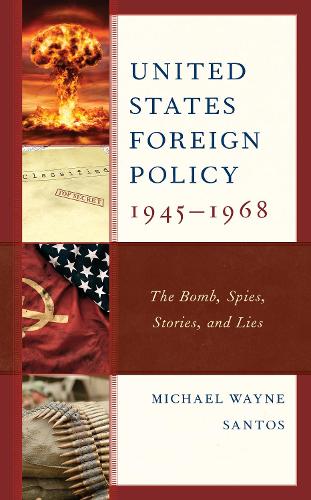
United States Foreign Policy 1945-1968: The Bomb, Spies, Stories, and Lies
(Paperback)
Available Formats
Publishing Details
United States Foreign Policy 1945-1968: The Bomb, Spies, Stories, and Lies
By (Author) Michael Wayne Santos
Bloomsbury Publishing PLC
Lexington Books
8th March 2022
United States
Classifications
Professional and Scholarly
Non Fiction
Warfare and defence
International relations
327.73009045
Physical Properties
Paperback
358
Width 153mm, Height 230mm, Spine 26mm
535g
Description
Between 1945 and 1968, the possibility of Mutual Assured Destruction led to a host of odd realities, including the creation of an affable cartoon turtle named Bert who taught millions of school children that nuclear war was survivable if they simply learned how to duck and cover. Meanwhile, fear of Communism played out against the backdrop of potential Armageddon to provide justification for a variety of covert operations involving regime change, political assassination, and sometimes bizarre plot twists. United States Foreign Policy 1945-1968: The Bomb, Spies, Stories, and Lies takes a fresh look at this complex, often confusing, and frequently farcical period in American and world history.
Reviews
This historical narrative expertly brings together a plethora of sources to explicate the complexities of decision-making during the most turbulent 23 years of the Cold War (194568). Though Santos (Univ. of Lynchburg) asserts no theoretical construct, seeking more to describe, he posits "satisficing" as the centralizing theme of the period, whereby decisions were made in light of short-term realities. As he details, the fallibility of decision-makers, seeming unwillingness to negotiate with enemies, imperfect intelligence, bureaucratic politics, unequal levels of rationality among the international actors, domestic sociocultural turmoil, and a rapidly changing dynamic of disparate nation-states exposed the limits of what was acceptable from regimes antithetical to an American agenda. Ultimately, these two decades of short-term satisficing "were motivated by a consistent themekeep communism ... out of the regions at all costs, a constraining rather than liberating framework for decision-making. Throughout this well-written text, Santos reveals similar overarching constraints to long-term thinking, referencing Dean Acheson's observation that the significance of events [is] shrouded in ambiguity as they are occurring. The lessons to be learned from this period continuously reveal themselves in Americas pursuit to export democracy today. Summing Up: Recommended. All readership levels.
* Choice *United States Foreign Policy 1945-1968 is a lucid, comprehensive account of this critical period in the history of the world. Michael Wayne Santos takes an even-handed approach to the volatile issues that unfolded during the Cold War, with an extensive bibliography that reflects the wide-ranging primary and secondary sources on which the author relies. -- William R. Keylor, Boston University
The Cold War was as much a set of stories as it was a scientific outcome' of structures and great power politics. Historian Michael Wayne Santos has written a beautifully textured analysis of the most important stories that shaped international relations in the second half of the twentieth century. This is a book brimming with fresh insight about how people, decisions, beliefs, and convictions about the nature of experience came together in a mix that continues to frame the stories we tell about world politics today. -- Steven Weber, University of California at Berkeley
Author Bio
Michael Wayne Santos is professor of history at the University of Lynchburg.
